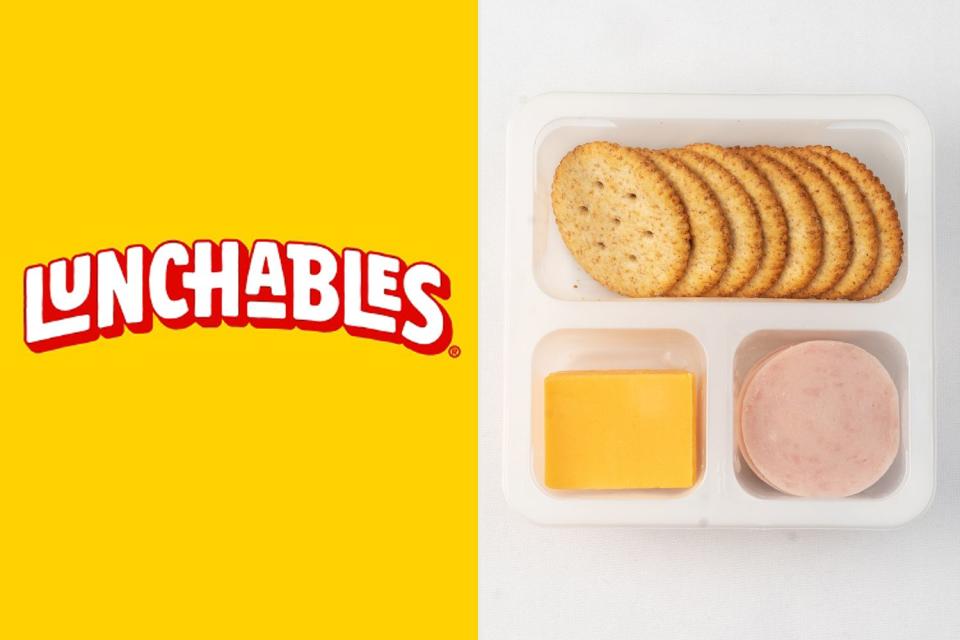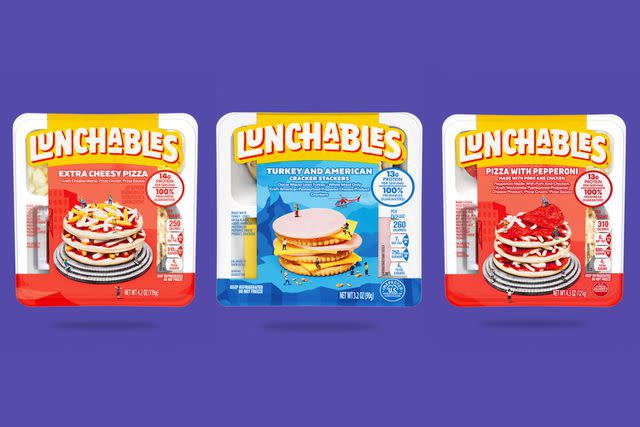Consumer Reports Urges USDA to Remove Lunchables from National School Lunch Program Due to High Levels of Lead, Sodium
A test of 12 store-bought versions of Lunchables and similar snack kits found “relatively high levels” of lead, cadmium and sodium

Kraft-Heinz/Lunchables; Sarah L. Voisin/The Washington Post via Getty
Consumer Reports is calling on the U.S. Department of Agriculture to remove Lunchables and similar lunch kits from the National School Lunch Program.
The organization made the announcement on April 9 after a test of 12 store-bought versions of Lunchables and similar lunch and snack kits found “relatively high levels” of lead, cadmium and sodium. The sodium levels in the kits reportedly ranged from 460 to 740 milligrams per serving — nearly a quarter to half of a child’s daily recommended limit.
Additionally, all but one of the kits contain harmful phthalates, a group of chemicals found in plastics that the National Institute of Health states is “detrimental to human health” and can lead to reproductive problems, diabetes, obesity, certain types of cancer and more.
A spokesperson for Kraft Heinz, maker of Lunchables, tells PEOPLE that the company has “taken great steps to improve the nutrition profile of Lunchables,” including reducing the sodium in all Lunchables crackers by 26%.
“All our foods meet strict safety standards that we happily feed to our own families. We are proud of Lunchables and stand by the quality and integrity that goes into making them,” the spokesperson said. “According to current science, processed foods arbitrarily classified as ‘ultra-processed’ are not necessarily less nutritious. In fact, many processed foods contain added nutrients, providing even more benefits to the consumer. The classification of foods should be based on scientific evidence that includes an assessment of the nutritional value of the whole product, not restricted to one element such as a single ingredient or the level of processing.”

Kraft-Heinz/Lunchables
Never miss a story — sign up for PEOPLE's free daily newsletter to stay up-to-date on the best of what PEOPLE has to offer, from celebrity news to compelling human interest stories.
Along with Lunchables, CR’s test also included kits from Armour LunchMakers, Good & Gather, Greenfield Natural Meat Co., and Oscar Mayer.
CR has since launched a petition to the USDA, already garnering over 10,000 signatures in favor of removing the popular lunch kits from the National School Lunch Program.
“Even in small amounts, lead and cadmium can cause developmental problems in children, with risks increasing from regular exposure over time,” the petition states. “And eating too much sodium can lead to high blood pressure: about 14 percent of children and teens have prehypertension or hypertension. Please remove these processed food kits from the lunch program, and offer our children healthier choices.”
“Lunchables are not a healthy option for kids and shouldn’t be allowed on the menu as part of the National School Lunch Program,” Brian Ronholm, director of food policy at Consumer Reports, said in a statement. “The Lunchables and similar lunch kits we tested contain concerning levels of sodium and harmful chemicals that can lead to serious health problems over time. The USDA should remove Lunchables from the National School Lunch Program and ensure that kids in schools have healthier options.”
The USDA did not immediately respond to PEOPLE’s request for comment.
About 28 million students each day in over 95,000 schools and educational institutions in the United States are provided with meals under the federal National School Lunch Program, according to the School Nutrition Association. About 19 million of those meals are free, while 8.5 million are paid in full and 1.1 million are served at a reduced price, according to the association report.
For more People news, make sure to sign up for our newsletter!
Read the original article on People.

